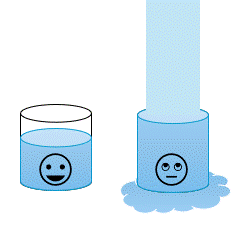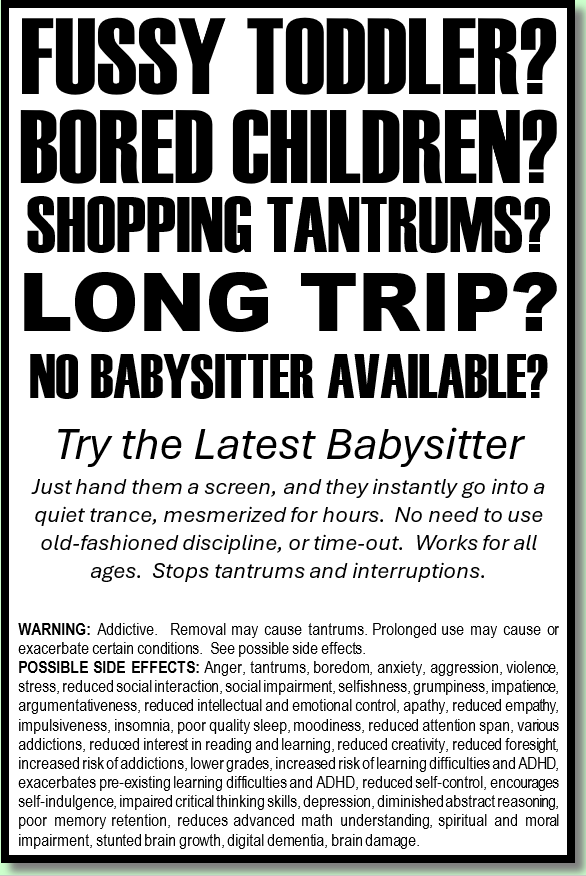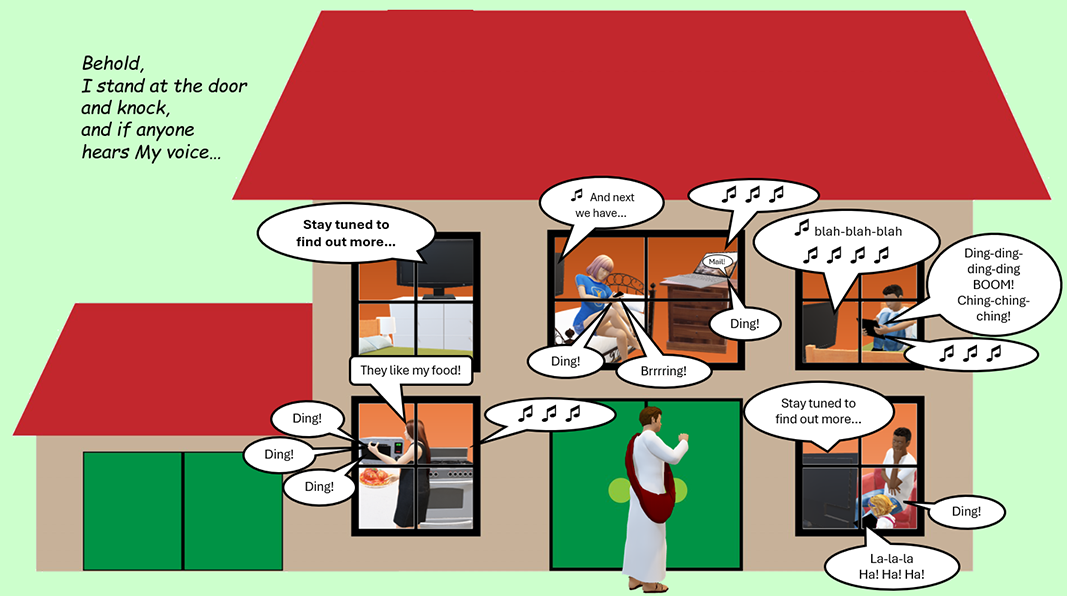Technology makes our lives
easier when it works, and more stressful when it doesn't. It
saves us time and can also help us waste time. There is
almost no such thing as down-time anymore, thanks to technology, we are
contactable at all times, and it is not just humans who are vying for
our attention, we get notifications from apps and websites, no matter
what we are doing, we are surrounded by news and advertising of all
sorts.
This has some major effects on our brains. 1.
Influence. 2. Overload. 3. Interrupted
concentration. 4. Social effects.
Influence:
We are a society adept at
substituting a quick fix for the stress of living. We don't
really know how to bear up gracefully in time of need because the
societal message is that we need never suffer. There's always
a McDonald's around the corner, a mall a mile away and a bar across the
street. Every headache gets a pill or a cup of coffee and every lack is
filled in two seconds. - I can't be an Addict, I'm a Christian p. 37
The values of our society have changed. Patience, planning,
saving and hard work have been replaced by, buy now pay later, just
take a loan, instant gratification, constant entertainment, and
everyone gets a prize.
Our brains process things best in real time. Whatever happens
in the real world by definition happens in real time. Our
modern world has changed our perception of what is real and one reason
for this is the invention of fast-paced media, our world becomes
surreal. - Digital Cocaine p. 109
Screen time gives immediate rewards. When you click on a
screen you immediately get a response… Since instruction in school
isn’t always interesting, instantly gratifying or rewarding,
screen-driven kids enter the classroom at a disadvantage. They are not
willing to risk failure or endure boredom… on a screen, if you make a
mistake, you can just start over without any consequences.
You simply hit the undo button, refresh the screen, or reboot… but in
the real world, you can’t go back to fix it. - Growing up Social p. 98
Overload
Our
brain is an amazing organ, the control centre of our bodies.
Many
different parts working together, learning, remembering,
regenerating.
However the way we live these days is having a negative effect on our
brains.

Imagine these cups represent the pleasure centre of your
brain, the cup on the left represents the way our ancestors lived, each
drop representing the boost of pleasure we get from the good things that
happen to us, the good things we see, the knowledge of a job well done
and so on. The cup on the right is our brains today in
constant
overload.
This constant overload can cause a variety of problems
for our brains and bodies. The very least being that blah
feeling when
we don't get the stimulation we are used to.
Technology plays a big part in this because technology is most often
the medium that brings the overload to us.
Interrupted
Concentration
The lack of down-time, the
overstimulation, and the constant interruptions that we all face, are
having a negative effect on our ability to concentration and
memorise. Learning difficulties are also exacerbated,
including dyslexia, ADD and ADHD. This is compounded by lack
of sleep, and the quality of sleep itself is affected by using screens
too close to bedtime, not having a regular bedtime, and not going to
bed when we should.
The book Digital Cocaine talks about digital multitasking, also known
as rapid toggling or task switching. An extreme example is:
Texting, while studying, and watching YouTube, checking email and
Facebook all at the same time. (p. 168) This is addictive
because each task switch triggers a dopamine hit in our brains. But
this type of multitasking reduces productivity and increases
mistakes. And because we are not practicing concentrating, we
are losing the ability, or never developing the ability, to concentrate.
We had an interesting discussion recently in a group of 10-13
year-olds. All of the kids in the group said: 1. Their
parents limit and/or monitor their screen time at home, and 2. That
they were academically in the top of their school classes.
But some of them also admitted that since they have had more screen
time in the last couple of years their grades are not as good as they
used to be.
Social
effects:
The digital home lends
itself to isolation which then breeds loneliness. Kids are in
their rooms on their screens, dad is on his computer watching sport and
mum is in another room on Facebook. None are connected with
each other although living under the same roof! - Digital
Cocaine p. 107
Children who grow up on screens become wired to use their gadgets to
communicate instead of face-to-face-interactions with people.
Dr Gary Small says, ‘The pathways for human interaction and
communication weaken as customary one-on-one people skills
atrophy.’ - Growing up Social p. 125
The authors bring out the fact that unless parents set and keep very
definite boundaries around the use of screens for both their children
and for themselves, children will miss out on learning important social
skills. Boundaries are needed both around the content, as
discussed earlier, and the time used. Important social skills
include the 5 A’s: Affection, Appreciation, Anger Management, Apology
and Attention.
Researchers are concerned that when screen time goes up, empathy goes
down. Kids are exposed to violence in video games, which can
desensitize them to pain in others, bullying, and acts of
violence. The ease of online friendships – you can just move
on to another friend if someone is bugging you – can make real-life
relationships too frustrating. – Growing up Social p. 45

Children hooked on screen
time are not only sedentary, but they are also being fed a stream of
advertising that increases their desire for unhealthy foods.
Screen-time kids are exposed to 5000 to 10000 food ads per year, most
of them for fast food and junk food. Watching television or
playing video games at night also hinders sleep. A child can
easily step into a vicious cycle of watching television or playing
video games, not exercising, eating junk food, sleeping poorly, and
gaining weight. These are destructive patterns for any child,
and for the shy child it can be particularly debilitating as it leads
to further isolation. – Growing up Social p. 121
Alvin Toffler, author of Future Shock says: “Constant stimulation of
the senses shuts down the analytical processes of the mind and
ultimately shuts down the ability to think and face life rationally.
This leads to escape techniques and adaptive responses which tend to
involve withdrawal, apathy, and rejection of disciplined thinking when
faced with difficult duties and decisions. - Depression the
Way Out p. 202
The author makes the note that both common substance addictions and
programs with ‘rapid changing scene reference’ – where the scene or
viewing angle changes several times in a minute, have a negative effect
on the frontal lobe of the brain. The frontal-lobe is the
control centre of the brain where conscious functions occur: reasoning,
planning, decision making, emotional control, behaviour, and
self-awareness. Rapidly changing scenes have a hypnotic
effect on the brain, so that what is seen, bypasses the evaluation of
the frontal-lobe, and goes straight into the memory, without the person
being able to pass judgement as to the suitability of the content.
A study comparing video content with the risk of attention problems in
young people found no increased risk with slow-paced education programs
(documentaries), 60% increased risk with fast paced entertainment, and
100% increase with violent programs, which are typically even more fast
paced. - Digital Cocaine p. 109
Our adrenal system is also pushed beyond its normal limits which
increases the risk of experiencing anxiety, depression, insomnia, high
blood pressure, diabetes, stress, and also affects our immune system. -
Digital Cocaine p. 51
Over-stimulation of the pleasure centre of the brain increases the risk
of addiction and is involved in addictions and all the problems that go
them, including withdrawal symptoms. Some of mental problems
include, boredom, digital dementia (early onset dementia that resembles
Alzheimer’s), brain damage and Anhedonia (the inability to feel
pleasure from normal activities).
We live in an addictive society, believing in the "dream" only to have
it shattered by reality. The Recipe for addiction is: 1. An addictive
environment 2. Stress 3. One or more mood-alterers. [And] not all
mood-alterers are ingested. Some of the most powerful
addictions do not involve alcohol, drugs or food, but are equally
destructive. This group is called process addiction, or
behavior addiction, in which the victim is caught in the tornado by
repetitive, life-controlling behaviors. These processes
include gambling, workaholism, compulsive worry, compulsive anger,
shopping, entertainment, exercising and religious perfectionism, but
there are many others. The numbers of process addictions can
be as numerous as the specialized interests of human beings and are
usually characterized by being healthy activities carried to unhealthy
extremes. - I'm a Christian, I can't be an Addict p. 43, 67
Other addiction examples listed in these books include: Pornography,
video game addiction, mobile phone addiction, multitasking addiction,
texting addiction, Facebook addiction, self-harm addictions, food
addictions (sugar, chocolate, coffee and other caffeine sources,
compulsive eating and craving foods that aggravate existing medical
conditions.)
Note: For a person to be 'action'-addicted, he must be on a destructive
course, caught in the addictive cycle… even noble pursuits can turn
into process addictions when they become all-consuming and
uncontrollable. - I'm a Christian, I can't be an Addict p. 67
This book also warns to beware of Cross-addictions: Many addicts may be
able to stop drinking or taking drugs but turn instead to other
compulsive behaviours such as work-aholism, caffeine ingestion or
food-aholism in an attempt to 'white-knuckle it'. These
cross-addictions mask the root and reinforce denial. - I'm a
Christian, I can't be an Addict p. 116'

You must love the LORD your God with all your heart, all your soul, all
your strength, and all your mind.’ And, ‘Love your neighbour as
yourself. - Luke 10:27 NLT
A study on iPhones related that while the participants didn’t
demonstrate the classic brain-based signs of addiction to their
iPhones, their brains responded to the sound of the phones in the same
way they would respond to their boyfriend, girlfriend, niece, nephew or
family pet. In short, it may not be an addiction in the
medical sense, but it is true love. – Digital Cocaine p. 32
You should know this, Timothy, that in the last days there will be very
difficult times. For people will love only themselves and
their money. They will be boastful and proud, scoffing at God,
disobedient to their parents, and ungrateful. They will consider
nothing sacred. They will be unloving and unforgiving; they
will slander others and have no self-control. They will be cruel and
hate what is good. They will betray their friends, be
reckless, be puffed up with pride, and love pleasure rather than God. -
2 Timothy 3 NLT
It is interesting to note the reference to ‘lovers of pleasure’, since
addictions and addictive behaviours, work by over stimulating the
pleasure centre. - I Can’t be an Addict – I’m a Christian p. 24
But you, Daniel, keep this prophecy a secret; seal up the book until
the time of the end, when many will rush here and there, and knowledge
will increase. - Daniel 12:4 NLT
Since the introduction of screens into our homes, each succeeding
generation has spent more and more time on screens, and been exposed to
them, from an earlier age. My husband is a tradie, and I have
often heard both him, and other tradies talking about the unreliability
of young people these days. They are constantly on their
phones, and not giving the proper time and attention to their
work. They can’t remember or follow instructions.
They can’t do maths. They can’t think ahead, they have no
initiative and can’t see what needs to be done. They don’t
respect other people’s stuff.
For God is working in you, giving you the desire and the power to do
what pleases Him. Philippians 2:13 NLT
The frontal-lobe of the brain is what sets humans apart from
animals. Our frontal-lobes are proportionally
larger. Not only is it our control centre for consciousness
and reasoning, it is also the centre for spirituality, moral
judgements, and empathy. It is here that we hear the still
small voice of God speaking to us. - Depression the Way Out
p. 181
As mentioned earlier, many types of media have a negative effect on the
frontal-lobe. And just as technology use is affecting the
ability of young people to work, it is also affecting their spiritual
ability. With each succeeding generation, the voice of God is
becoming harder and harder to hear.
As a kids Sabbath School leader, a Pathfinder counsellor, and
a parent, I have many times observed the change that comes over kids when they
receive a phone or tablet for their birthday.
Their interest, and ability to sit and listen diminishes. Their ability to remember and memorise is greatly
reduced. Last year in Pathfinders, I
could teach the Memory Gem Bible verses, by singing a phrase at time, half a
dozen times, before adding the next phrase, and in just a few minutes, several of
the kids would repeat the verse back to me.
This year, most of these same kids can’t, and it takes 3 or 4 meetings
of revision before they can remember the verse.
Their joy and excitement at learning diminishes, as does their desire to
be helpful. They lose their interest and
willingness to participate in the different aspects of worship. I used to see this
happening with mid-teens, then it was early teens, now it is often junior age
kids. How much more are those who are
currently toddlers going to be affected?
I have heard it said that the end of the world is not some
arbitrary point in time that God randomly chooses. Instead, it is the point at which, even if
more time was allowed, no one would change their mind. I believe this, as I can see it happening
around me. We are living in the end time,
just like it was in the days of Noah.


 Imagine these cups represent the pleasure centre of your
brain, the cup on the left represents the way our ancestors lived, each
drop representing the boost of pleasure we get from the good things that
happen to us, the good things we see, the knowledge of a job well done
and so on. The cup on the right is our brains today in
constant
overload.
Imagine these cups represent the pleasure centre of your
brain, the cup on the left represents the way our ancestors lived, each
drop representing the boost of pleasure we get from the good things that
happen to us, the good things we see, the knowledge of a job well done
and so on. The cup on the right is our brains today in
constant
overload.


